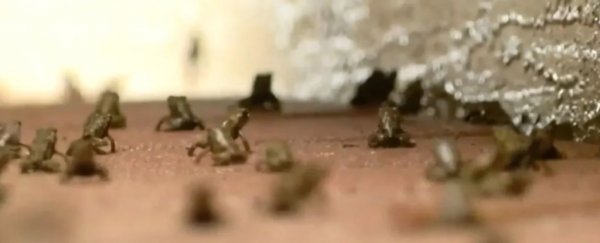Thousands of poisonous toads have flooded a South Florida neighborhood, raising fears about the dangers they pose to pets and children, according to local reports.
The toads started appearing in Palm Beach Gardens, a city of 55,000, north of Miami, in recent weeks, according CBS Miami.
They have been found in people's gardens, swimming pools, sidewalks and driveways in the Mirabella neighborhood, according to footage shared by WPTV, an NBC affiliate in Palm Beach.
"I just see a massive amount of toads or frogs everywhere, covering every square inch," resident Jenni Quasha told WPTV. "You can't even walk through the grass without stepping on one."
OUTBREAK OF TOADS 🐸An bizarre infestation is leaving a Palm Beach Gardens community concerned @HughesWPTV https://t.co/bo4064yxdO pic.twitter.com/4RYY4rHhxe
— WPTV (@WPTV) March 20, 2019
"It's not hundreds, you're talking a thousand of these little baby frogs," resident Carollyn Rice told CBS Miami.
News outlets reported that the toads were poisonous bufo toads, also known as cane toads. The toads are not native to the United States, but their presence in Florida dates from the accidental release of about 100 from a pet dealer at the Miami airport in 1955, according to the University of Florida.
Bufo toads secrete a toxic milky substance from their heads when they are handled or threatened. It can burn eyes, irritate skin and pose a serious danger to cats and dogs if the toads are ingested, the university said.
The Florida Fish and Wildlife Conservation Commission did not return requests for comment. It was not immediately clear if the infestation was ongoing.
The Mirabella at Mirasol Homeowners Association declined to comment when reached by The Washington Post.

Mark Holladay, the lead technician with Toad Busters, told CBS Miami that heavy rains in the area and a warmer winter presented a ripe climate for the amphibians to breed. He said the toads were coming from a lake in the community and warned residents to keep pets and children away from them.
"If a pet was to ingest too many of them, even at that small size, it would cause a problem," he said.
Quasha told CBS that the toads were affecting the quality of life in the area.
"There's no swimming in the pool and no playing outside and enjoying the outdoors," she said. "Just hoping we can figure this out so we can put an end to it."
2019 © The Washington Post
This article was originally published by The Washington Post.
